This post may contain ads and affiliate links and we may earn a small commission when you click on the links at no additional cost to you. As an Amazon Affiliate, we earn from qualifying purchases. You can read our full disclaimer here.
Golden Retriever Cold Tolerance: Winter Wellness for Your Pup

When it comes to Golden Retriever cold tolerance, many owners often question if their beloved pet can endure the chilly winter months.
Golden Retrievers, a breed celebrated for their amiable and extroverted nature, do possess a certain level of cold resistance. This is partly due to their dense double coat, which offers a degree of insulation.
However, there are several considerations to keep in mind regarding their ability to withstand cold temperatures.
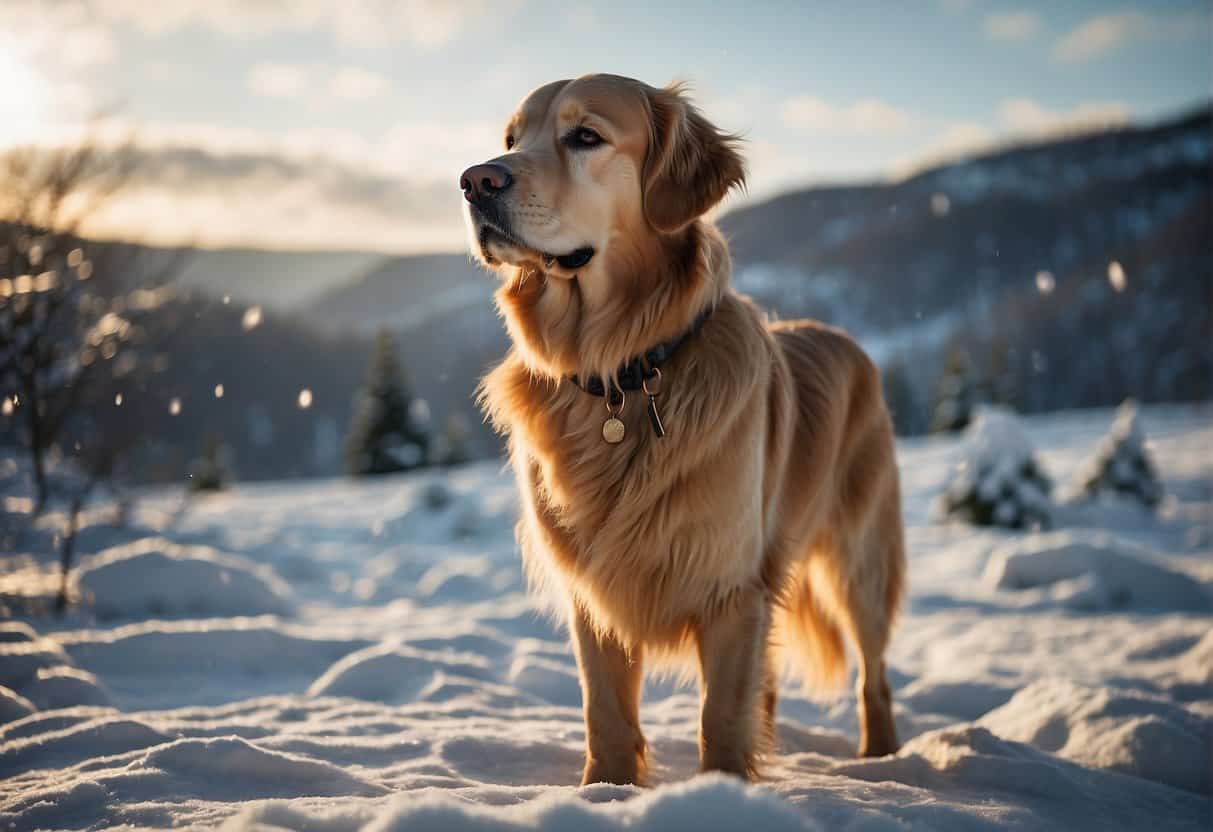
Understanding your Golden Retriever’s cold tolerance is important for their health and well-being. Factors such as age, health, and activity level can all play a role in their ability to handle colder temperatures.
Taking the necessary precautions and providing proper care during the winter months can help ensure your golden retriever stays safe and comfortable.
Breed Overview Related to Golden Retriever Cold Tolerance
If you’re considering adopting a Golden Retriever, it’s essential to understand the breed’s physical traits and coat characteristics. Here’s what you need to know:
Physical Traits
One of the most distinctive features of a Golden Retriever is their thick, double coat. Their outer coat is water-resistant and can range in color from light to dark golden.
They also have a soft, dense undercoat that provides insulation and helps regulate their body temperature.
Coat Characteristics
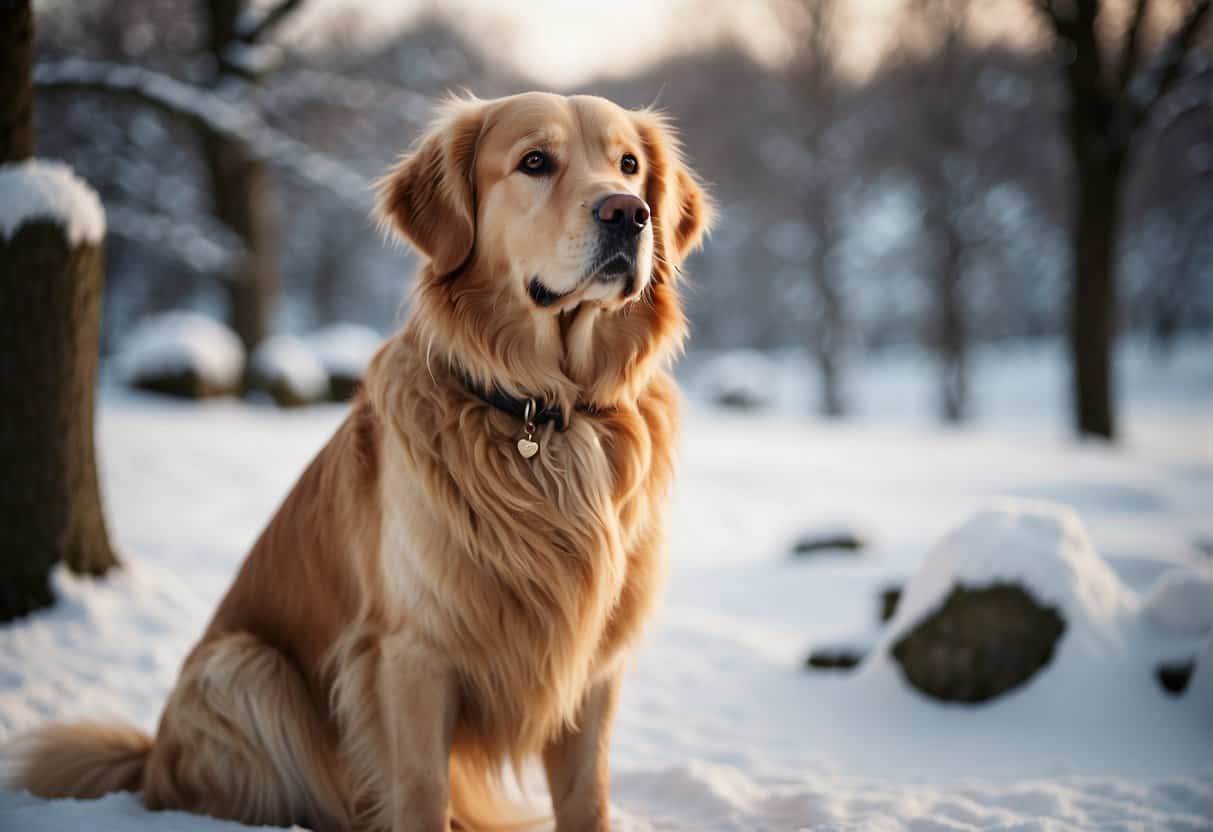
Golden Retrievers are known for their shedding, especially during seasonal changes. They require regular grooming to keep their coat healthy and prevent matting. Brushing their coat at least once a week can help remove loose fur and prevent tangles.
It’s also important to note that Golden Retrievers have a high tolerance for cold temperatures due to their thick double coat.
However, if you live in an area with extreme cold weather, you should provide your dog with additional protection such as a coat or sweater.
The fashionable cable knit and playful striped patterns make any Golden Retriever stand out, while the practical turtleneck design and easy pullover style ensure a snug fit and effortless dressing.
Understanding Golden Retriever Cold Tolerance
When it comes to cold tolerance, Golden Retrievers are known for their ability to withstand cold temperatures. However, understanding how they are able to do so is crucial to ensure their well-being during cold weather.
Body Temperature Regulation
One of the key factors in a Golden Retriever’s ability to tolerate cold is their body’s ability to regulate temperature. Their body temperature is naturally higher than humans, which helps them stay warm in colder temperatures.
Additionally, their body is able to adjust its temperature based on the environment, allowing them to conserve energy and maintain their body temperature.
Insulation and Double Coats
Golden Retrievers have a thick double coat of fur that provides insulation and protection from the cold. The outer coat is made up of long, water-resistant hairs that help keep them dry in wet and snowy conditions. The undercoat is soft and dense, providing insulation by trapping body heat close to their skin.
To further enhance their insulation, Golden Retrievers also have fur on their ears, tails, and paws. This helps protect these sensitive areas from the cold and prevents heat loss.
Health and Age Factors Involved in Golden Retriever Cold Tolerance
When it comes to cold tolerance, a Golden Retriever’s health and age are important factors to consider. Puppies and senior dogs are more vulnerable to the cold weather than healthy adult dogs.
Puppy Cold Sensitivity
Puppies have a harder time regulating their body temperature, making them more susceptible to the cold. It’s important to keep them warm and dry, especially during their first few months of life.
You can do this by providing them with a warm and cozy bed, blankets, and clothing if necessary.
Senior Dogs and Cold Weather Special Considerations
As Golden Retrievers enter their senior years, they often face increased health challenges that affect their cold weather tolerance. Conditions like arthritis can become more prevalent, hindering their mobility and comfort in colder temperatures.
To ensure your aging Golden Retriever stays comfortable during winter, consider the following:
- Extra Warmth: Provide a cozy, warm bed in a draft-free area of your home.
- Appropriate Clothing: Consider dog sweaters or coats, especially for outdoor excursions.
- Limited Exposure: Reduce the time they spend outside in cold weather, focusing on short, more frequent outings.
- Comfortable Mobility: Assist them in navigating slippery surfaces and provide easy access to their favorite spots.
- Regular Health Check-ups: Regular vet visits are crucial to monitor and manage any age-related health issues.
Being mindful of your senior Golden Retriever’s health and age is crucial in cold weather. By offering them the right care and attention, you can help ensure their well-being and comfort throughout the colder months.
Golden Retriever Cold Tolerance Risks and Protection
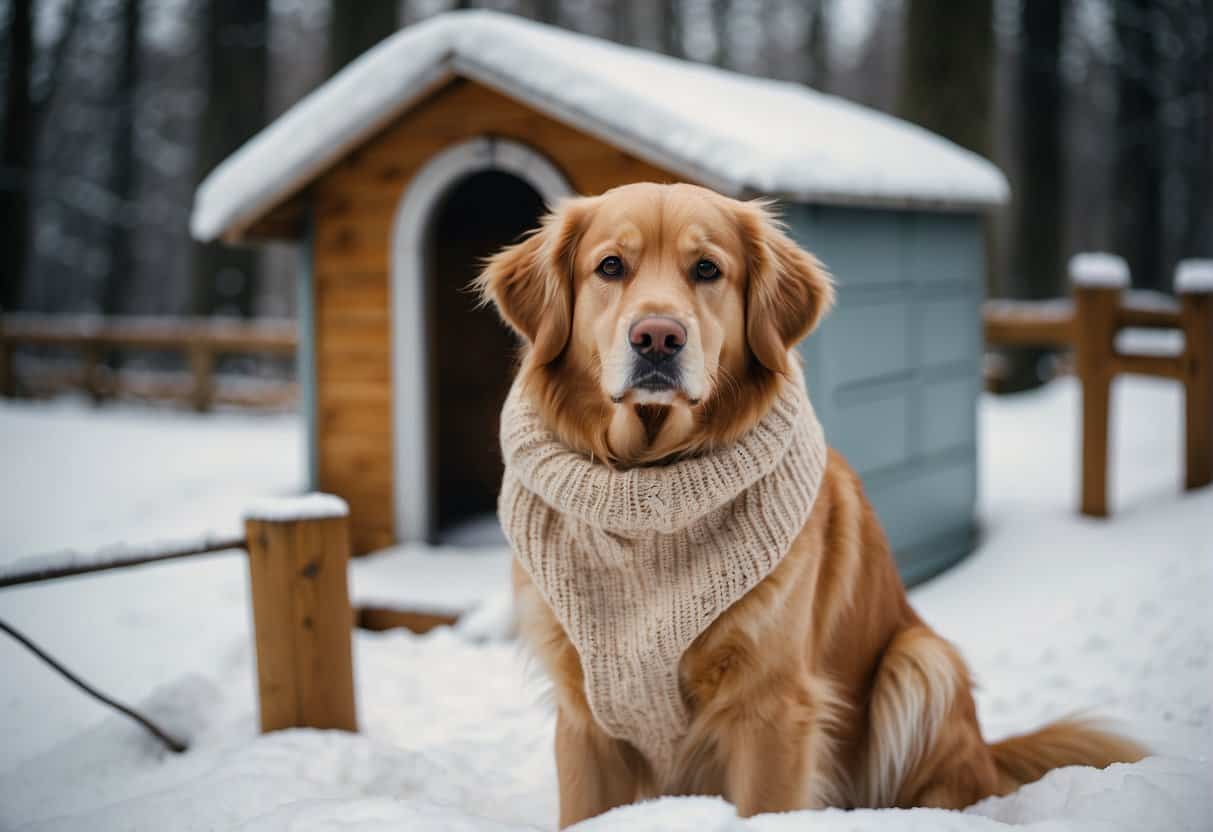
Hypothermia and Frostbite
Cold weather can pose serious risks to your golden retriever’s health. Hypothermia and frostbite are two common cold weather conditions that can affect dogs.
Hypothermia occurs when your dog’s body temperature drops below normal levels, while frostbite occurs when the skin and underlying tissues freeze. Both conditions can be life-threatening if left untreated.
Symptoms of hypothermia include shivering, lethargy, weakness, and confusion. If you suspect your dog is suffering from hypothermia, it is important to warm them up immediately.
Here is a table summarizing the stages, body temperature ranges, symptoms, and recommended treatments for dog hypothermia:
| Stage | Body Temperature | Symptoms | Treatment |
|---|---|---|---|
| Mild | 32-35°C (90-95°F) | Shivering, lethargy, weakness | Warm blankets, indoor heating, warm fluids |
| Moderate | 28-32°C (82-90°F) | Muscle stiffness, low heart rate, stupor | Heated blankets, warm fluids, vet intervention |
| Severe | Below 28°C (Below 82°F) | No shivering, inaudible heartbeat, unconsciousness | Immediate veterinary emergency care |
Treating Hypothermia:
- Recognize the Symptoms: Look for signs like shivering, lethargy, weakness, and confusion.
- Immediate Warming: Gently wrap your dog in warm blankets or towels.
- Move to a Warm Environment: Bring your dog into a warm, indoor space away from the cold.
- Apply Gentle Heat: Use a hair dryer on a low setting or a warm water bottle wrapped in a towel. Avoid direct contact with the dog’s skin.
- Offer Warm Fluids: If your dog is conscious, provide warm (not hot) water to drink.
- Seek Veterinary Care: Even after initial warming, it’s essential to get your dog checked by a veterinarian.
Symptoms of frostbite include pale, gray, or blue skin, swelling, and blisters. If you suspect your dog has frostbite, it is important to seek veterinary care immediately.
Do not try to thaw the affected area yourself, as this can cause further damage.
Treating Frostbite:
- Identify the Symptoms: Look for pale, gray, or blue skin, swelling, and blisters.
- Protect the Area: Avoid rubbing or massaging the affected area.
- Do Not Apply Direct Heat: This can cause additional tissue damage.
- Keep the Area Clean and Dry: Gently pat the affected area with a dry towel.
- Seek Veterinary Assistance Immediately: Professional care is necessary to properly treat frostbite.
- Prevent Further Exposure: Keep your dog away from cold conditions until fully recovered.
Protective Measures

There are several measures you can take to protect your Golden Retriever from the cold. One of the easiest ways is to provide them with a warm, insulated dog house.
This will give them a place to retreat to when the weather gets too cold. You can also provide them with blankets or a heated mat to keep them warm.
If you plan on taking your dog outside in cold weather, consider outfitting them with booties to protect their paws. This will prevent ice and snow from building up between their toes, which can cause discomfort and even injury.
Comfort meets durability in these stylish, easy-to-wear boots, providing your canine companion with protection against sharp objects and extreme temperatures. Perfect for active dogs who love the outdoors!
It is also important to monitor your dog’s behavior and body temperature when outside in cold weather. If they start shivering or seem uncomfortable, it is time to head back inside.
By taking these protective measures, you can help ensure that your Golden Retriever stays safe and healthy during the cold winter months.
Winter Care and Activities for Golden Retriever Cold Tolerance
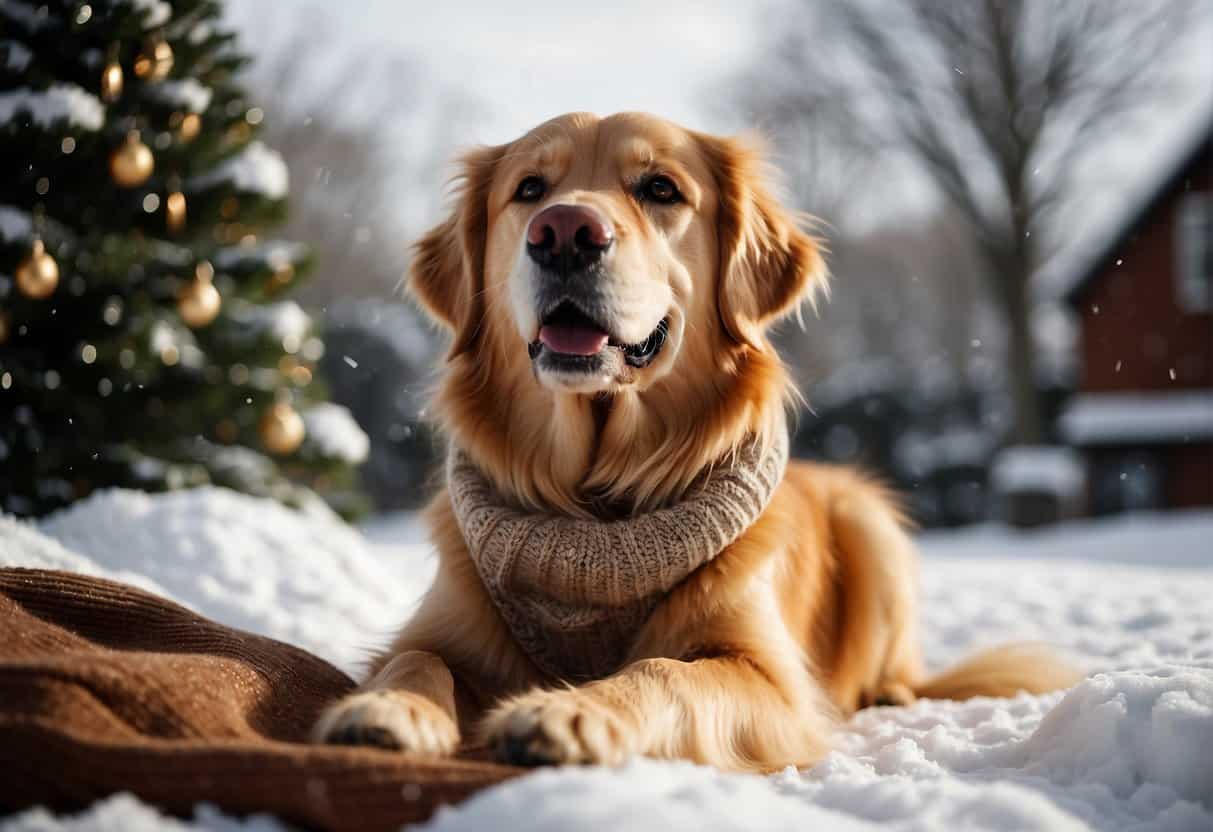
When winter comes, you need to take extra care of your Golden Retriever. Here are some tips to keep your furry friend healthy and happy during the colder months.
Exercise and Play in the Cold
Golden Retrievers love to play in the snow, but you need to be careful not to overdo it.
Take frequent breaks and monitor your dog for signs of shivering or discomfort. You can also consider getting your dog a winter coat or sweater to keep them warm during outdoor activities.
If the weather is too harsh, you can still keep your dog active and entertained indoors. Play fetch or hide-and-seek, or set up an obstacle course for your dog to navigate.
Mental stimulation is just as important as physical exercise, so don’t forget to keep your dog’s mind engaged with puzzle toys or training exercises.
Indoor Warmth and Shelter
When it’s time to come inside, make sure your Golden Retriever has a warm and cozy spot to rest. A dog bed with extra padding or a heated blanket can provide comfort and warmth.
If you use a space heater, make sure it’s placed safely away from your dog and never leave it unattended.
It’s also important to provide your dog with a sheltered area outside, such as a covered porch or doghouse. This will give your dog a place to escape from the cold and wind. Make sure the shelter is insulated and has plenty of bedding to keep your dog warm.
Behavioral Signs of Cold Stress
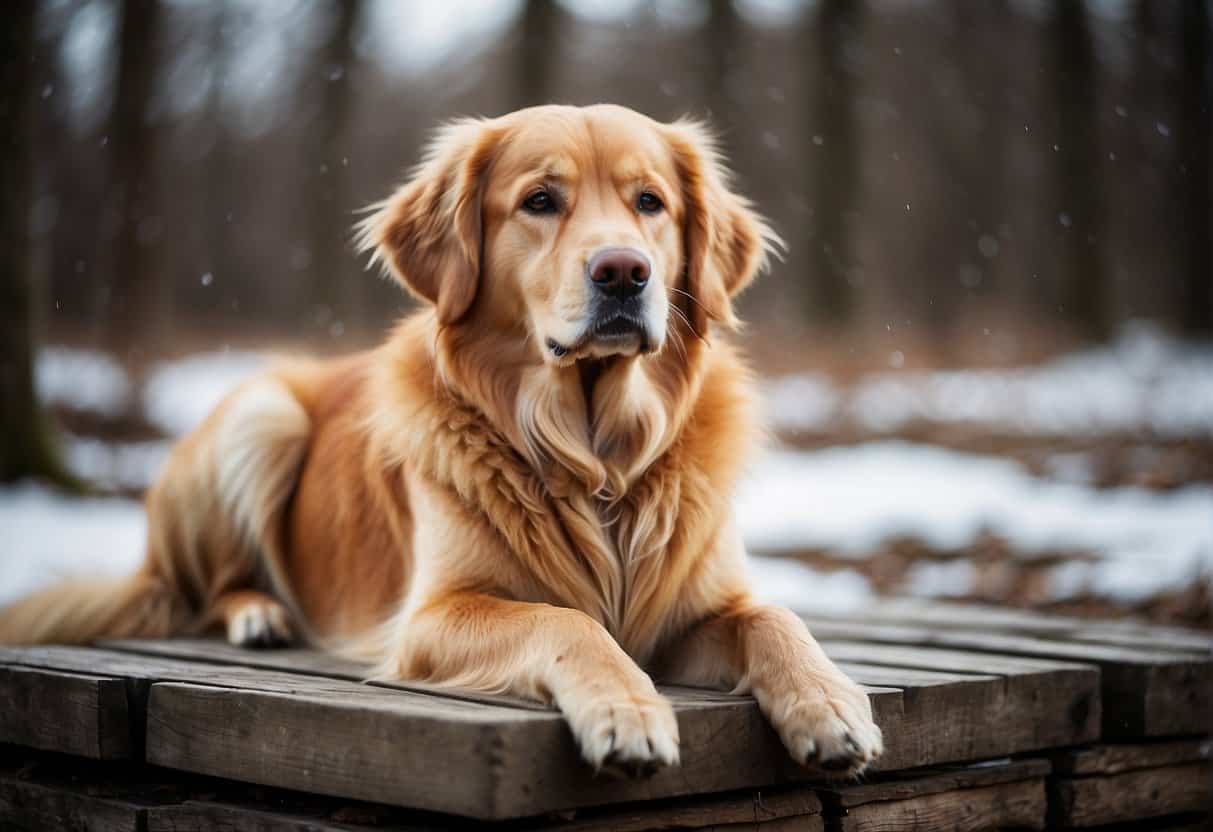
As a responsible owner of a Golden Retriever, it is essential to be aware of the signs of cold stress in your furry friend. Cold stress can be harmful to your dog’s health and well-being, and it’s important to recognize the signs of discomfort before it becomes a serious problem.
Shivering and Lethargy
One of the most common signs of cold stress in dogs is shivering. Shivering is a natural response to cold temperatures, and it helps the body generate heat.
However, if your Golden Retriever is shivering excessively, it could be a sign that they are too cold and need to warm up.
Another sign of cold stress is lethargy. If your dog seems tired or sluggish, it could be a sign that they are experiencing discomfort due to the cold. Lethargy can be a sign that your dog is trying to conserve energy and generate heat.
Reluctance to Go Outside
If your Golden Retriever is reluctant to go outside, it could be a sign that they are experiencing discomfort due to the cold.
Dogs are typically eager to go outside and play, but if they seem hesitant or reluctant, it could be a sign that they are too cold and need to warm up.
It’s important to note that some dogs are more tolerant of cold temperatures than others. However, it’s always better to err on the side of caution and make sure your dog is warm and comfortable.
Golden Retriever Cold Tolerance Safety Precautions and Tips
When it comes to cold tolerance, Golden Retrievers are relatively hardy dogs. However, as a responsible pet owner, it is important to take certain precautions to ensure your furry friend stays safe and healthy during the winter months.
Appropriate Outdoor Time
Golden Retrievers love to play outside, but it’s important to limit their time in the cold to prevent hypothermia.
You should also be aware of the signs of hypothermia, which include shivering, lethargy, and decreased heart rate. If you notice any of these symptoms, bring your dog inside immediately and warm them up with blankets and a warm water bottle.
Diet and Nutrition in Winter
During the winter months, your Golden Retriever may need more calories to maintain their body temperature. Make sure to feed them a high-quality dog food that is appropriate for their age and activity level.
You can also add some healthy fats to their diet, such as fish oil or coconut oil, to help keep their coat shiny and healthy.
It’s also important to make sure your dog stays hydrated during the winter months. While they may not be as thirsty as they are in the summer, make sure fresh water is always available to them.
Adapting to Various Weather Conditions
Cold Climates vs. Mild Winters
As a Golden Retriever owner, it’s natural to wonder how well your dog can adapt to different weather conditions. Golden Retrievers are known to be a breed that can tolerate a wide range of temperatures, but it’s important to understand how they adapt to cold climates versus mild winters.
In cold climates with freezing temperatures, your Golden Retriever will need extra care to stay warm.
It’s important to provide them with a waterproof coat and boots to protect their paws from the snow and ice. You should also limit their time outside and provide them with a warm and cozy shelter to rest in.
During mild winters with low temperatures, your Golden Retriever may not need as much protection. However, it’s still important to monitor their behavior and provide them with a warm shelter if needed. Additionally, make sure to limit their time outside during extreme temperature changes.
Transitioning Between Seasons
Golden Retrievers can adapt well to temperature changes, but it is important to help them transition between seasons. During the transition from hot weather to cooler temperatures, your Golden Retriever may need extra care to adjust to the changes.
To help your golden retriever transition, gradually decrease their time outside in hot weather and increase their time outside in cooler temperatures.
Additionally, you can provide them with a waterproof coat and boots to protect them from rain and snow.
In conclusion, Golden Retrievers have a good tolerance for different weather conditions. With proper care and attention, they can adapt well to cold climates, mild winters, and temperature changes.
Frequently Asked Questions about Golden Retriever Cold Tolerance
Golden Retrievers can tolerate cold weather better than hot weather, but they still have a limit. Generally, if the temperature drops below freezing (32°F or 0°C), it’s too cold for a Golden Retriever to be outside for an extended period of time. However, this can vary depending on the individual dog’s coat thickness, age, health, and activity level.
It’s not recommended for Golden Retrievers to sleep outdoors in snowy conditions, as they can easily become too cold and suffer from hypothermia. Instead, provide them with a warm and dry shelter indoors, preferably in a heated room or with a heating pad.
Golden Retrievers have a thick double coat that provides insulation against the cold. However, if the temperature drops significantly below freezing or if your dog has a thin coat, they may benefit from a winter coat or sweater. It’s important to choose a coat that fits well and doesn’t restrict movement.
The Chill Wrap Up for Golden Retriever Cold Tolerance
While Golden Retrievers may bring sunshine into our lives, they’re not immune to the chill of winter. As responsible owners, it’s our duty to keep an eye out for the icy grip of hypothermia and frostbite.
By staying vigilant and prepared, we can ensure our furry friends enjoy the winter wonderland safely. Remember, when the temperature drops, our care and attention should rise!
-

Coffee Mug – In Dog Coffees I’ve Only Had One
$11.95 – $14.95 Select options This product has multiple variants. The options may be chosen on the product page


